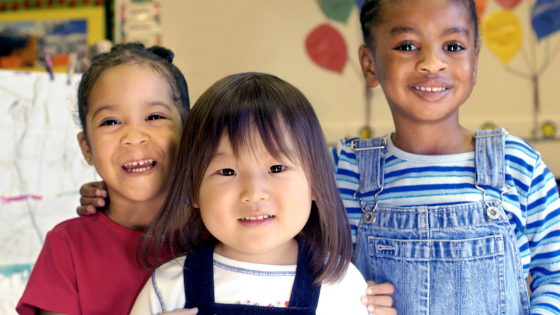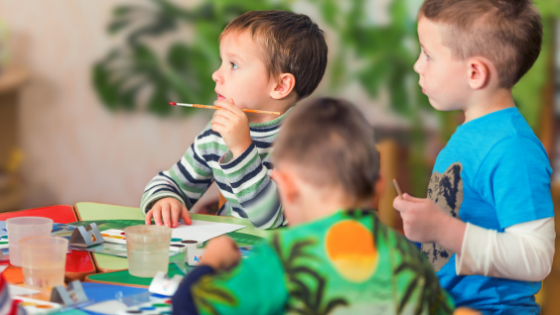School readiness. Are there two words more likely to provoke ‘lively discussion’ in any group of early childhood educators? Then if you bring some parents and school teachers into the group, and add another two words – say, ‘standardised testing’ – that discussion will almost certainly escalate from ‘lively’ to ‘heated’.
School readiness as a concept or program is variously felt by members of the ECE sector to be some combination of:
- a vital developmental outcome
- a savvy marketing tool
- a harmless parental request
- a pointless bureaucratic tick-a-box
- the destruction of all that is good and happy about childhood.
Why so much conflict when starting school is a mandatory step for every Australian child? How is it that there is such a disconnect between different parties and philosophies in what looks like a simple process? Can’t we just agree what children need to know and be able to do to be called ‘school ready’?
The wild world of Australian education
Australia is not known for its homogenous approach to education. Our provision of public, independent, distance, home, and faith-based schools is bewildering to many outsiders, even before they try to understand our national, state, territory and parent-sourced funding regime.
While we now have a well-established National Curriculum for 11 years of schooling, we’re yet to agree on a single set of subjects and teaching for the final two years of senior study.
In fact, we can’t even agree on what to call the first year of ‘formal’ school. It’s Foundation in the National Curriculum but no one calls it that as a grade of school. It’s Kindergarten, Reception, Transition, Prep or Pre-Primary, depending where you live.
School readiness
That quick peek at Australia’s complex educational landscape points to jurisdictional complexity as just one of the reasons we are yet to agree on what school readiness means, what it should require of a child, and even whether it’s a useful construct in the transition of children from early learning to formal education at around the ages of five or six (school starting age being another vexed area in Australia).
Australia’s National Education Leader, Rhonda Livingstone, broadly captured school readiness in her introduction to this ACECQA blog post:
School readiness is an often trotted out phrase for children in the term or even year before they are due to start formal schooling. In reality, however, children begin their learning journey from birth, and in fact many researchers would assert that learning begins before birth.
Rhonda goes on to describe generally agreed types of activities undertaken in many services:
Being well prepared for school encompasses more than stencils and writing names. It also requires planning to ensure success. … It is important to collaborate with children and their families to explore any anxieties, unpack any myths and set goals for a smooth transition.
We know the importance of incorporating activities to support the transition to school in everyday play based learning opportunities, such as encouraging children’s participation in group games and experiences, and having regular ‘lunch box’ days so children can practice opening and eating their own lunch.
We also know the importance most families place on literacy and numeracy as an indicator for children’s preparedness for school. As educators, we know that these skills can be incorporated in play based activities for all children to participate in, based on children’s interests.

Family readiness
When we look at tensions behind what school readiness means, the adult groups involved are the child’s family, their early childhood educators, and their future school teachers. Communication and interpretation gaps often exist between all three groups, leading to those ‘myths’ that Rhonda referenced unpacking in her blog post.
There’s no shortage of material on school transitions in academic and policy journals, but some new research from a Charles Darwin University PhD student certainly adds to our Australian understanding of the ‘disconnect’.
Researcher, Amy Graham found teachers believe around two-thirds of children starting school have at least one cause for concern about their ‘readiness’. That might be in their emotional development, social skills, cognitive maturity, physical or literacy development.
Amy’s study focused on the ‘readiness’ activities parents engaged in with their children rather than in ECE, but it can be safely assumed they are the same kinds of literacy activities parents often expect services to deliver.
Literacy vs behaviour
Parents were found to value literacy in their child very strongly and 94% of parents undertook literacy activities aimed at school readiness, at least three times each week.
“But while parents value literacy, and work on it with their child, my research found this did not automatically translate into providing a high level of literacy preparation experiences for their child, in some kinds of families,” Amy said.
However, the biggest factor for teachers was not the reading and writing ability of new starters. According to Amy, school teachers ‘just want teachable kids’.
Cognitive vs noncognitive
Another way of putting this tension is that the obvious school readiness skills are cognitive, while the less obvious but possibly more important are noncognitive. Cognitive skills involved tasks with set outcomes achieved by solving problems or decoding language. Academic abilities are often cognitive and are, in many cases, quantifiable and measurable.
Noncognitive skills – according to this style of classification – cover everything else. Emotional regulation, attentiveness, social skills, behavioural characteristics. And of course this is a simple approach: cognitive skills can influence noncognitive attributes, and the reverse is also true.
A less academic set of terms is ‘hard skills’ for cognitive, and ‘soft skills’ for noncognitive. You may have seen these phrases in other media as the business world is recently very focused on encouraging education systems to produce graduates with more strengths in the soft, noncognitive end of the skills spectrum.
This aspect of skills and school readiness came out in part of ACARA’s response to CELA’s questions about the influence school curriculum and assessment – especially the NAPLAN tests in Year 3 – is having on play-based early learning.
What is ACARA?
The Australian Curriculum, Assessment and Reporting Authority – ACARA – was established in 2008 and implemented both the National Curriculum (to Year 10) and a regime of national standardised testing to accompany the implementation, NAPLAN.
CELA got in touch with ACARA this year after reading this article on the First Five Years website. In this article, and some other papers, it was claimed that NAPLAN’s ‘push down’ effect was extending beyond the school gates and affecting the quality of early years learning in preschool groups and even younger children.
We were curious about how ACARA viewed the Early Years Learning Framework, play-based learning, soft skills, and whether NAPLAN’s impact was being measured up to five or six years before a child sat their first test. If so, it takes school readiness into a new dimension. We aren’t just talking about four year olds being prepared to open their lunchboxes and trace the alphabet, but also about narrowing the focus on their cognitive (hard) skills for outcomes that won’t be known until the end of Year 3.
Push down effect
The idea behind the push down effect is that when teachers are aware of being judged by student outcomes in standardised testing they are more likely to ‘teach to the test’ – narrowing the curriculum to spend more time on the topics likely to be assessed in NAPLAN’s literacy and numeracy exams. In Australia those exams begin in Year 3, and continue in Years 5, 7, and 9. While intended to help schools better meet individual and class group learning needs, for many families a child’s NAPLAN scores are seen to play a significant role in scholarship and grant applications and senior streams of study.
Teachers have reported for many years now a push down effect attributed to NAPLAN. Year 2 teachers say they have pressure to focus on Year 3 work too early, for example, and Year 4 teachers racing through requirements so their class can spend more time on the style and topics to be assessed in Year 5.

Hitting the early years
You can read the argument in the First Five’s article in greater detail here.
According to one of the interviewees, Queensland academic Laurien Beane:
The academic expectations in kindergarten [preschool] are very different to what they were before NAPLAN was introduced…Now some centres are choosing to focus on learning sight words and short phrases. And the stress can impact children and parents. Teachers are having to navigate knowing how important soft skills are for children of this age while managing with the academic push down from NAPLAN.
ACARA on play and soft skills
So we asked:
What is ACARA’s position on play-based learning in Foundation, Year 1 and Year 2 at primary school? For instance, is play-based learning supported and encouraged in Foundation/Kindergarten/Prep curriculum and teaching?
ACARA: The Australian Curriculum expects Foundation to Year 2 students to bring to school a wide range of experiences, abilities, needs and interests. A student’s desire to make sense of the world provides a platform to plan and review their learning through interactions with others, experimentation, explicit teaching, practice and play in the classroom and beyond. The Australian Curriculum builds on the key learning outcomes of the national Early Years Learning Framework…
Learning area rationales, structural information, content descriptions and achievement standard information can be used to draw connections from the Early Years Learning Framework. However, the Australian Curriculum does not mandate pedagogy and practice.
Are ‘soft skills’ present in any way in NAPLAN testing in Year 3 or other years?
ACARA: NAPLAN is a literacy and numeracy assessment and does not test ‘soft skills’ – as the focus is on the demonstration of literacy and numeracy skills and understandings.
However, development of literacy and numeracy capabilities should not preclude the development of socioemotional skills, as these can be modelled and taught in unison.
For example, students can learn new vocabulary while also learning how to work collaboratively in small groups, they can learn to persevere and support one another while working on complex numeracy problems.
Has ACARA seen any evidence of the ‘push down’ effect making play-based learning difficult to sustain in early primary years?
It is the responsibility of state and territory curriculum and school authorities for the implementation of the Australian Curriculum in their schools, in line with system and jurisdictional policies. As noted on the website, the Australian Curriculum builds on the key learning outcomes of the national Early Years Learning Framework.
Meet the author

Bec Lloyd is the founder and managing director of Bec & Call Communication, providing professional writing, editing and strategy services to the school and early childhood education sector since 2014. In 2018 she launched UnYucky mindset and menus for happier family mealtimes. Formerly the communications lead at ACECQA and BOS (now NESA), Bec is a journo and mother of three who produces Amplify for us at Community Early Learning Australia.